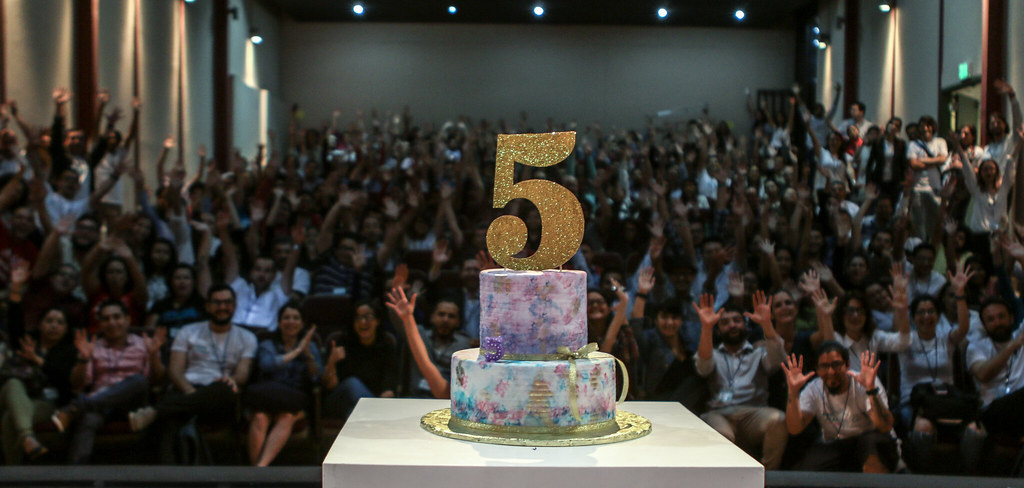Silvana Fumega and Fabrizio Scrollini
Source: Abrelatam 2017
The title of this post reflects the spirit of the “collaborative agenda” session, an open discussion space during the V edition of Abrelatam/Condatos. These agenda building spaces aim to map emerging issues and to give a voice to conference participants. This short post is about one of these sessions.
Abrelatam/Condatos events were catalyst for building a community with high levels of interaction and trust among actors, a significant difference from other regions. But this community did not emerge overnight. Relationships were built edition after edition. These bonds of trust are present not only between actors from the same sector; but also across sectors. For instance, the participation of government representatives in the last edition of Abrelatam, an event that began as an exercise between civil society actors, increased significantly The boundaries between different sectors have started to blur over the years because. As mentioned during the collaborative agenda session, “ we are all weird bugs that go in the same direction “. Many of those who are now public servants have been members of civil society organisations in the past, and vice versa. This has been instrumental in maintaining momentum and establishing the continuity of many policies. This point will be particularly important during the coming months while we experience many changes of administration in the region.
However, while we must celebrate the achievements, there are still many challenges to face, in terms of the future editions of Abrelatam/Condatos as well as, more generally, this community.
The main challenges, although the participants worked in different groups, were aligned, mostly, around 4 points. They are:
1.Systematization of knowledge and learning. One of the main challenges relates to the systematization of generated knowledge in the areas of open data and civic technology within the region. Numerous research and projects have been developed and implemented (more and less formalized). However, we need to collect and systematize the experiences so that this knowledge, in order to be able to share it effectively. If we do not know what other actors have done and analyzed, we can hardly learn from their experiences and research. In ILDA we have recently launchedRIGA, with the aim of contributing to this effort at an academic level, although the challenge raised is well beyond our effort.
2.Understanding what works. The systematization of information goes hand in hand with an improvement in measuring the results of projects and pilots. Moreover, the idea of talking about success and failure tells little about what might have worked, in a given context, within a specific ecosystem. That is, we must not only improve the instruments to assess results but also be able to isolate contextual variables from replicable ones. The methodology strength when you start to think about projects is key in this process.
These first two points are related to the possibility of learning from each intervention and being able to share those learnings with other actors.
3.Private sector inclusion. A major challenge for this community of actors is the inclusion of members of the private sector, both at the corporate level and also small and medium-sized businesses. This need has often been mentioned but the efforts have not yet materialized.
4. A regional strategic direction. Improving regional interaction, at a project level, was one of the topics repeatedly mentioned during the session. Due to the difficulties encountered in trying to impose commitments to the whole region, it was considered that, within the Abrelatam/Condatos framework, a priority thematic line of work could be selected. That is to promote that as many actors as possible develop their projects within a guiding framework/concept. As a result of the conversations this year, issues related to gender violence have emerged as a strong guide for advancing actions in the region given the seriousness of the problem.
We have just returned to our homes, after a week of hard work and discussions. Latin America has once again shown that is a vibrant and committed community, even in uncomfortable times. Open data policies are not secure, communities that use data for civic purposes face enormous challenges, and there is still a need to build capacities in governments and society to scale up this agenda if it wants to live up to the genuine challenges of the region. The call is to concentrate efforts, to include new actors and advance the field in the issues that matter.
ILDA acted as facilitator and a caretaker, promoting this community and agenda, in alliance with a large number of actors that have made this path possible. Our commitment is to develop and implement actions that help this community to grow and act on the key issues and needs of the region. We will focus our efforts on helping to structure part of this community, advance gender and open-contracting issues, as well as to collaborate with capacity building in the region. However, we can’t, and we don’t want to, do all this alone. Our main contribution is, and will be, to collaborate with the actors in this agenda so that together we can advance towards a fair and open Latin America.
To see more about the event you can check the work that colleagues from Hivos Costa Rica produced in this link


















